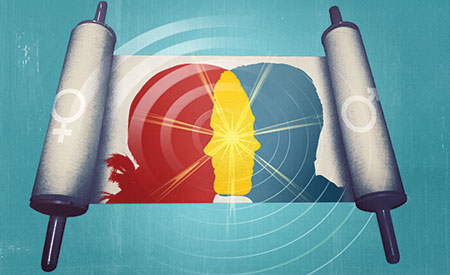Being Jewish
Commentary
#MeToo and the Jewish Man

No one could have predicted it—no more than you could predict a tsunami. I am referring to one of the fastest growing social movements of our time—#MeToo, encompassing women who have accused powerful men of sexual abuse and harassment.
How do I, as a cisgender heterosexual middle-aged Jewish male leader, respond to #MeToo? To quote part of a passage from our morning prayers: lishmoa, lilmod, u’lelamed. To hear, to learn, to teach.
First, have we heard the complaints of sexual harassment that have come from women who volunteer or work in the Jewish community? The tales about powerful communal leaders are disturbing. Multiple accusers have described harassment from big donors and others.
Lishmoa must lead to learning, lilmod—to internalize deeply. Men should reflect on their behavior. Do they take women’s accusations seriously? Do they stand up for them? Is teshuvah, repentance, necessary? What would repentance look like?
And, finally, le’lamed, to teach. We need to speak more about gender and sexuality with young people. We need to seek our tradition’s wisdom on what it means to be a man. We need to teach our youth that sex is healthy and fun—and, like everything good in life, needs to have boundaries.
We need to teach that all people have an inclination to do good (yetzer hatov) and also have the opposite inclination to, well, act like a jerk (yetzer hara). Those two urges battle within the human soul and spirit. The only way to feed the good inclination is to do good things. The evil inclination feeds itself quite well on its own. As it says in Mishnah, Avot 4:1:
“Who is brave? The one who controls his yetzer hara.”
We have to remind ourselves—and some men of a previous generation—that the world has changed. Sexist jokes have gone the way of the Nehru jacket and men should be careful about touching women. The Mad Men era of male entitlement is over.
We need to teach young men and women that there is a Jewish way to engage in sex:
“[You] must begin by speaking to your mate in a manner that will draw her heart to you, calm her spirits and make her happy…speak to her so that your words will provoke desire, love, will
and passion” (Iggeret HaKodesh, a mystical work written in the 13th century).
We need to teach young men that it is very rare for there to be equal power between any two people in a relationship. But, when one person uses power to manipulate another, bad stuff happens.
“A man should never force himself upon his wife and never overpower her, for the divine spirit never rests on one whose relations occur in the absence of desire, love and free will”
(Iggeret HaKodesh).
The sin of making people tools for our desires, turning them into objects—in Martin Buber’s language, of turning Thous into Its—is one that we confess on Yom Kippur; chozek yad, the sin of abusing power.
Women need to hear the messages as well. Our tradition lauds sexual fulfillment for women. To be made in the divine image is to respect oneself, to hear warning bells if an encounter feels creepy—or is simply unwanted. Each woman’s body is her own and she can and should have her own rules.
This is Torah—a Torah of kindness and mutual respect that we so desperately need today.
Jeffrey K. Salkin is the senior rabbi of Temple Solel in Hollywood, Fla., and a noted writer and speaker. His column, “Martini Judaism,” appears regularly in the Religion News Service.










 Facebook
Facebook Instagram
Instagram Twitter
Twitter
Leave a Reply